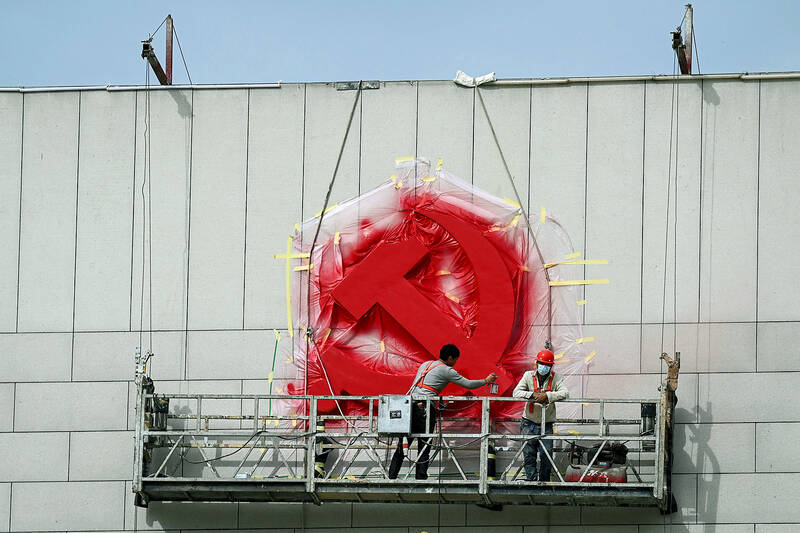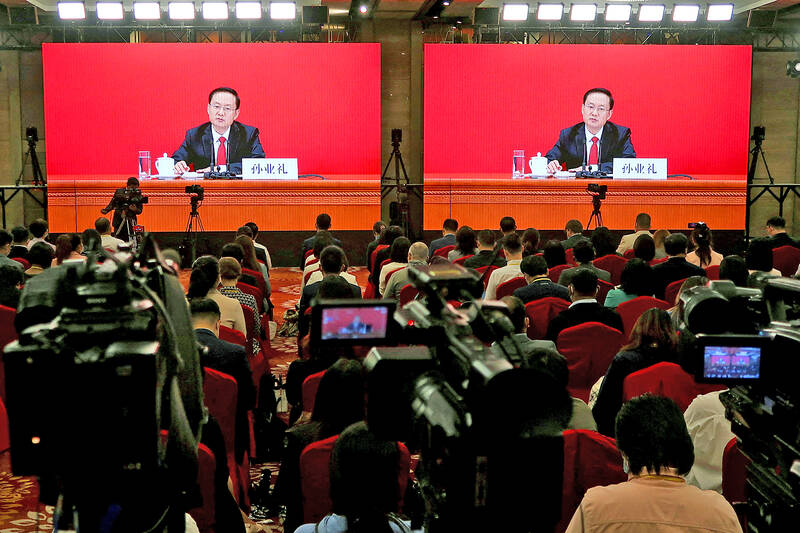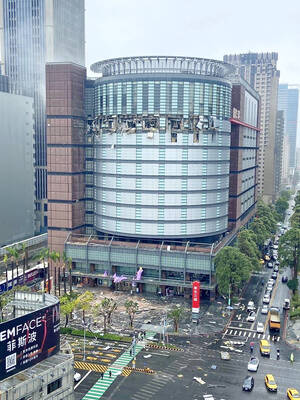China today launches a twice-a-decade party conference at which Chinese President Xi Jinping (習近平) is expected to receive a third five-year term that breaks with recent precedent and establishes himself as arguably the most powerful Chinese politician since Mao Zedong (毛澤東).
Xi is expected to issue a lengthy address at the opening session, but little change is foreseen in his formula of strict one-party rule, intolerance of criticism and a hard-line approach toward COVID-19, including quarantines and travel bans even as other countries have opened up.
As with most Chinese political events, little information has been released beforehand and the outcome of the National Congress of the Chinese Communist Party (CCP) is only to be announced after several days of closed-door sessions.

Photo: AFP
At a two-hour news conference yesterday, the congress’ spokesperson Sun Yeli (孫業禮) reaffirmed the government’s commitment to its “zero COVID” policy, despite the economic costs, and repeated its threat to use force to annex Taiwan.
China reserves the right to use force over Taiwan as a last resort in compelling circumstances, though peaceful reunification is its first choice, Sun said.
However, he said China would not tolerate what he called a movement toward full independence supported by hardliners and their overseas backers.

Photo: Reuters
Sun offered few details about what if any changes would be enacted to the party’s charter at the meeting, which is expected to last about a week.
The congress is the 20th in the history of the century-old party, which boasts about 96 million members, more than 2,000 of whom are to attend the Beijing meetings.
The changes would “incorporate the major theoretical views and strategic thinking” concluded in the five years since the last congress, said Sun, a deputy head of the CCP’s Propaganda Department who is not well known outside party circles.
The amendment or amendments would “meet new requirements for advancing the party’s development and work in the face of new circumstances and new tasks,” Sun said.
Xi has left little room for further political aggrandizement, having placed himself thoroughly in charge of domestic affairs, foreign policy, the military, the economy and most other key matters overseen by party working groups that he leads.
The congress comes as China’s economy is facing major headwinds amid a near-collapse in the real estate sector and the toll on retail and manufacturing imposed by COVID-19 restrictions that upped the regime’s already intense monitoring of the population and suppression of free speech.
Sun offered no hope that China would be backing away from the “zero COVID” policy, which Xi and other leaders have made a political issue despite criticism by the WHO and others that it is not a practical long-term solution given improvements in vaccines and therapies.

ACCOUNTABILITY: The incident, which occured at a Shin Kong Mitsukoshi Department Store in Taichung, was allegedly caused by a gas explosion on the 12th floor Shin Kong Group (新光集團) president Richard Wu (吳昕陽) yesterday said the company would take responsibility for an apparent gas explosion that resulted in four deaths and 26 injuries at Shin Kong Mitsukoshi Zhonggang Store in Taichung yesterday. The Taichung Fire Bureau at 11:33am yesterday received a report saying that people were injured after an explosion at the department store on Section 3 of Taiwan Boulevard in Taichung’s Situn District (西屯). It sent 56 ambulances and 136 paramedics to the site, with the people injured sent to Cheng Ching Hospital’s Chung Kang Branch, Wuri Lin Shin Hospital, Taichung Veterans General Hospital or Chung

‘TAIWAN-FRIENDLY’: The last time the Web site fact sheet removed the lines on the US not supporting Taiwanese independence was during the Biden administration in 2022 The US Department of State has removed a statement on its Web site that it does not support Taiwanese independence, among changes that the Taiwanese government praised yesterday as supporting Taiwan. The Taiwan-US relations fact sheet, produced by the department’s Bureau of East Asian and Pacific Affairs, previously stated that the US opposes “any unilateral changes to the status quo from either side; we do not support Taiwan independence; and we expect cross-strait differences to be resolved by peaceful means.” In the updated version published on Thursday, the line stating that the US does not support Taiwanese independence had been removed. The updated

‘CORRECT IDENTIFICATION’: Beginning in May, Taiwanese married to Japanese can register their home country as Taiwan in their spouse’s family record, ‘Nikkei Asia’ said The government yesterday thanked Japan for revising rules that would allow Taiwanese nationals married to Japanese citizens to list their home country as “Taiwan” in the official family record database. At present, Taiwanese have to select “China.” Minister of Foreign Affairs Lin Chia-lung (林佳龍) said the new rule, set to be implemented in May, would now “correctly” identify Taiwanese in Japan and help protect their rights, the Ministry of Foreign Affairs said in a statement. The statement was released after Nikkei Asia reported the new policy earlier yesterday. The name and nationality of a non-Japanese person marrying a Japanese national is added to the

There is no need for one country to control the semiconductor industry, which is complex and needs a division of labor, Taiwan’s top technology official said yesterday after US President Donald Trump criticized the nation’s chip dominance. Trump repeated claims on Thursday that Taiwan had taken the industry and he wanted it back in the US, saying he aimed to restore US chip manufacturing. National Science and Technology Council Minister Wu Cheng-wen (吳誠文) did not name Trump in a Facebook post, but referred to President William Lai’s (賴清德) comments on Friday that Taiwan would be a reliable partner in the